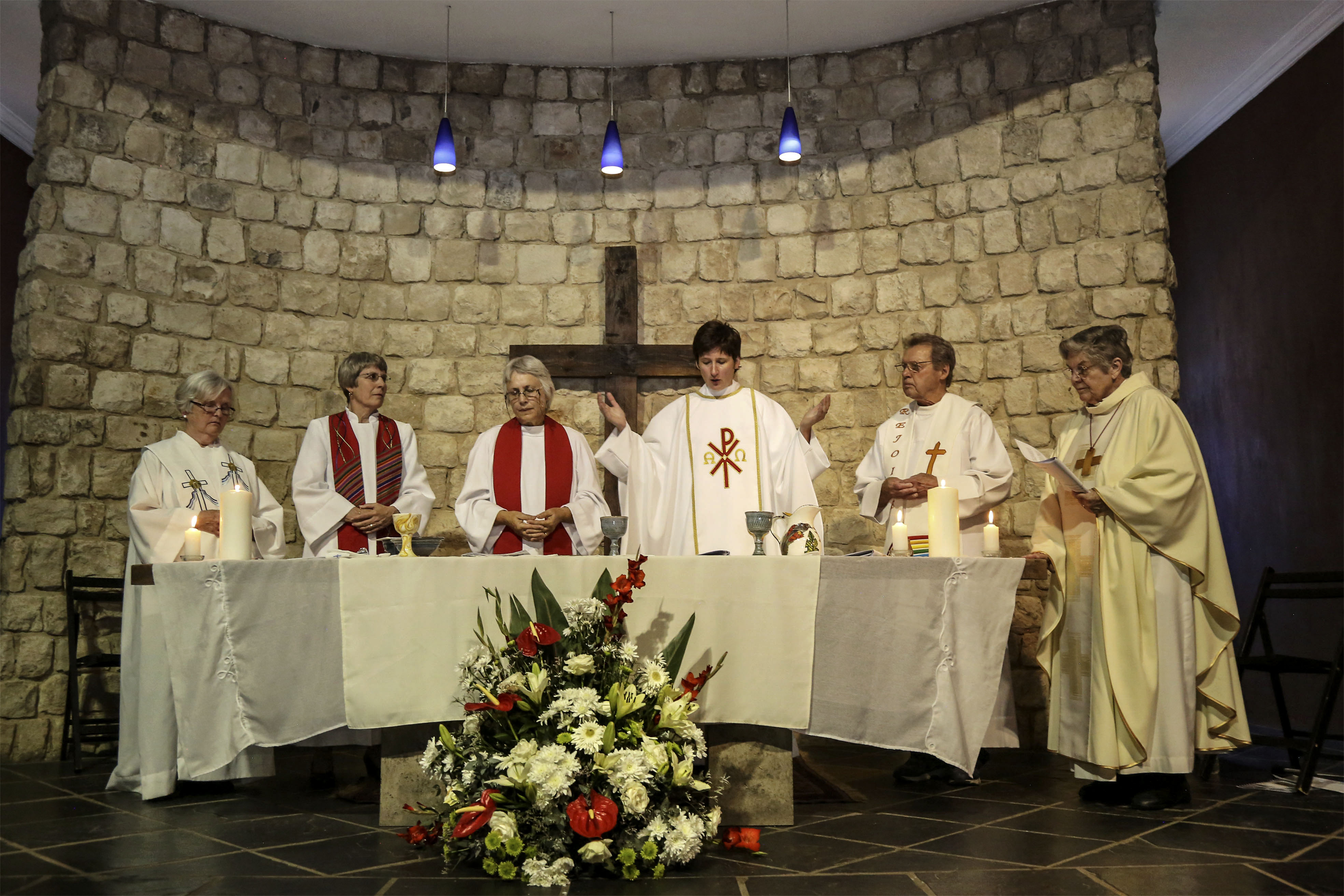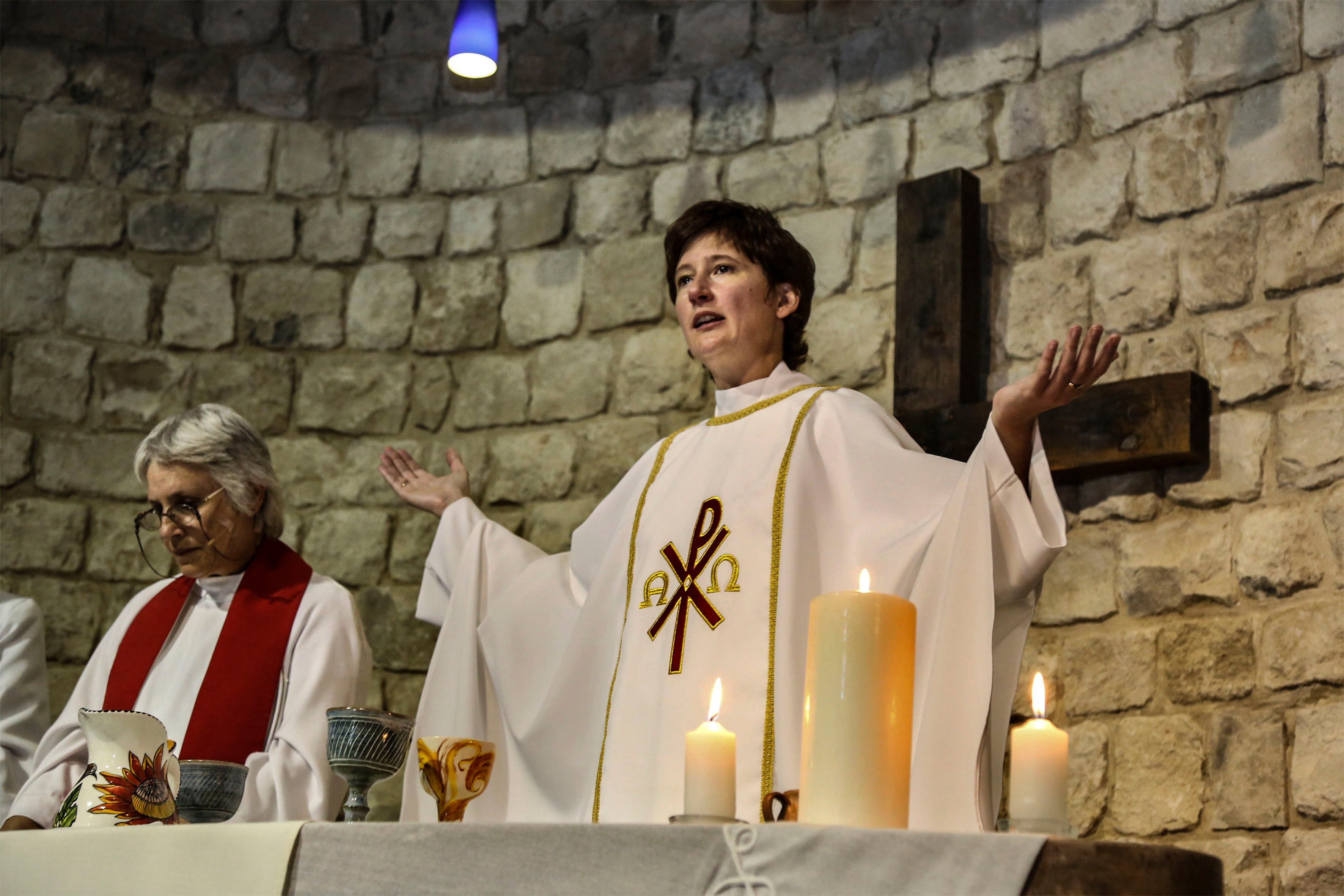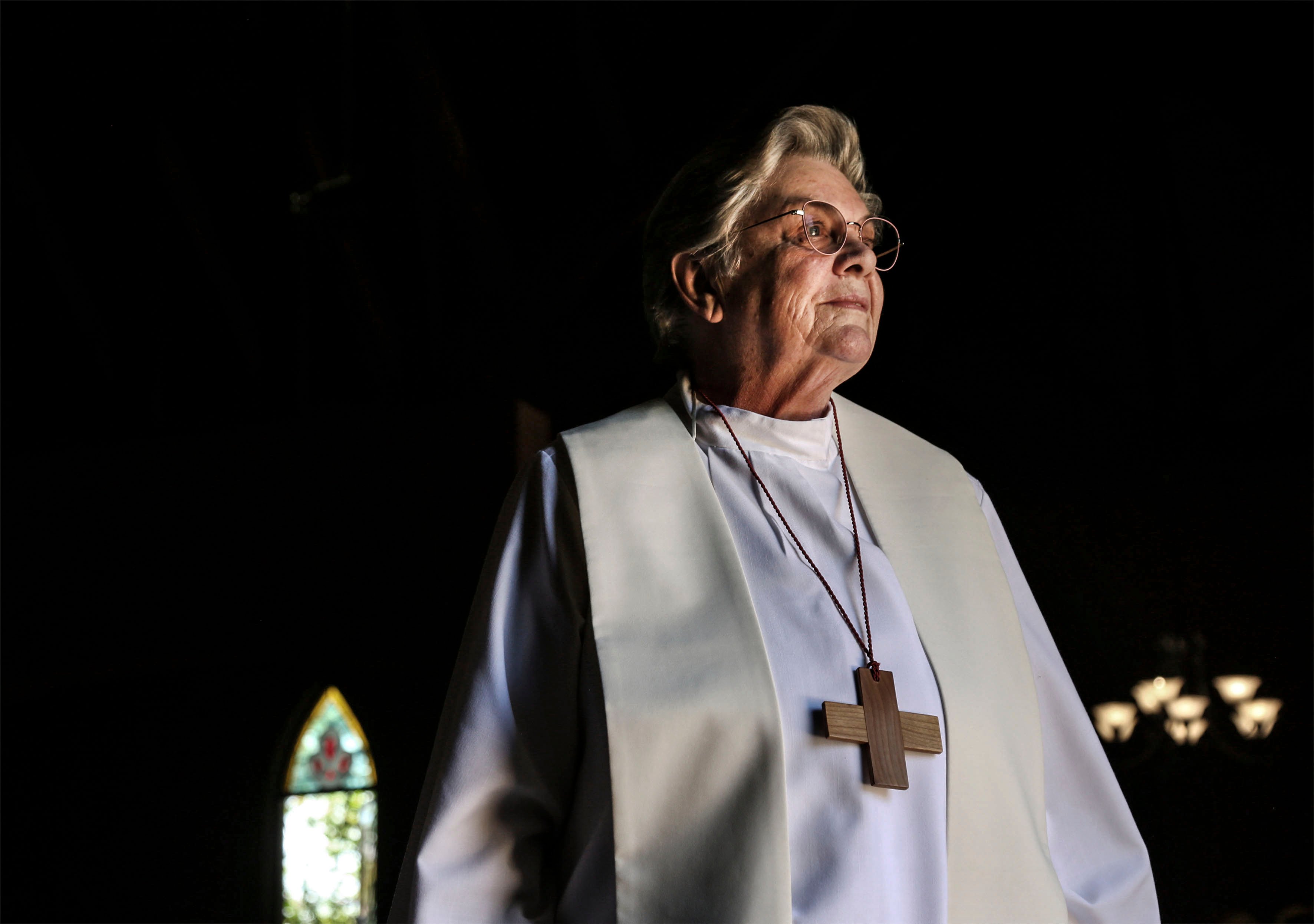Lay me down: Dianne Willman became only the fourth South African woman to be ordained in the Catholic tradition.
A woman lies prostrate in front of the altar while three officiants in cassocks, stoles and vestments lead the service.
Although the scene in this stone-and-stained-glass chapel next to the post-denominational Mosaiek Church in Northcliff, Johannesburg, may look the picture of Roman Catholic orthodoxy, it is far from ordinary.
Most of the 150-strong congregation are women, including those wearing the dog collars that mark them out as clergy. Each of the three officiants are women, including the bishop.
Dianne Willman is about to become only the fourth woman priest ordinated in the Catholic tradition in South Africa. The first South African woman to be ordained was Patricia Fresen, in Barcelona in 2003. She is officiating in her capacity as bishop today. Next was Mary Ryan, ordained by Fresen in Cape Town in 2014. She is also officiating. Ann Ralston, the third, was ordained in 2016 and lives in the Western Cape.
 Equal in God’s eyes: Dianne Willman with Mary Ryan, the second South African woman to be ordained, to her right performs the concelebration of the liturgy of the Eucharist. (Matthew Willman)
Equal in God’s eyes: Dianne Willman with Mary Ryan, the second South African woman to be ordained, to her right performs the concelebration of the liturgy of the Eucharist. (Matthew Willman)
The Catholic Church has excommunicated them all — after all, according to official dogma, the very notion of a female priest is heresy. So seriously is this position observed that even those who have come to watch Willman’s ordination risk losing their jobs. Yet today they have come in numbers. One female member of a Catholic religious order explains her presence thus: “I don’t know what compromises me more: to come or not to come.”
Willman and the three other female priests are affiliated to Roman Catholic Women priests (RCWP), an organisation driving the push for women priests to be recognised by the Vatican. In 2002, RCWP oversaw the ordination of seven women on the banks of the Danube River in Germany. The ceremonies were performed by male bishops, so that the women priests can claim apostolic succession.
Apostolic succession is the belief that priests are ordained in direct succession, bishop to priest, traced back in a direct line to Jesus’s twelve apostles. Once ordained, the priesthood cannot be undone by human hand. So, because RCWP’s first women were ordained by bishops with apostolic succession in the Roman Catholic Church, all their subsequent ordinations are valid, they say.
“We women are no longer asking for permission to be priests,” RCWP proclaims on its website. “Instead, we have taken back our rightful God-given place ministering to Catholics as inclusive and welcoming priests.” The organisation acknowledges it has “challenged and broken the church’s Canon Law 1024”, calling it “an unjust law that discriminates against women” that in good conscience cannot be obeyed.
“It is simply the right thing to do to include women in the priesthood and include her gifts at the Eucharistic table — and elsewhere,” says Willman. “If this is being feminist, so be it. Jesus was a feminist too then, since he empowered women in so many ways in his lifetime.”
Dianne Willman (44) is a lawyer of two decades and now heads up training in the asset forfeiture unit as a deputy director of public prosecutions in the National Prosecuting Authority.
 Dianne Willman performs the elevation of the consecrated gifts to God and the Great Amen by the people. (Matthew Willman)
Dianne Willman performs the elevation of the consecrated gifts to God and the Great Amen by the people. (Matthew Willman)
“I attempted religious life as a sister [nun] after matric,” she says. “I then pursued a career in law. As a prosecutor, I stand for justice. As an advocate, I could speak for victims and try to bring healing to a society torn apart by crime. My job is consistent with who I am — for the empowerment and growth of others to help make a better world.
“And yet something was lacking. By finally answering my call to priesthood, I feel like I have come home.”
Willman says she has yearned for priesthood since childhood. “My games involved saying Mass. I was blessed with a strong Catholic family. I had a very positive experience of religion and being loved by God. It was not difficult to entertain the possibility of being a priest, despite the prohibitions.”
Before RCWP started ordaining Catholic women priests, “I didn’t have options to consider priesthood”, says Willman.
For decades, since the Catholic Church’s nearest Protestant neighbour, the Anglicans, started allowing women to be priests, Catholic women who wanted to be priests have been advised to migrate to that church.
If a woman chooses to stick to Catholicism, it comes at a cost.
“Excommunication is automatic for anyone who attempts to be ordained, or attempts to ordain,” says Willman. “There is no process and one doesn’t even need to be notified. It can be reversed if one recants publicly.”
This bothers her: “Such automatic consequence without some kind of ‘due process’ goes against the grain of a basic understanding of justice.”
Her sharp legal brain also points out that by using the phrase “attempting ordination” in relation to women priests, the church is trying to convey that ordination does not take place. “How can one be penalised for attempting something that doesn’t supposedly exist? One is left wondering if the church really believes ordination doesn’t take place.
“Just like law and society evolved, so should the church,” Willman argues. “New situations arise with which the law must grapple. The notion of tradition in the Catholic Church is used to keep the law from changing and being responsive to evolving understanding. The church says that excommunication is the consequence that follows my choice. But is excommunication the choice?
“Perhaps a better way is to say I choose to become a marginalised or outcast person in the church, to become ‘poor’ in one sense and in that way minister in greater freedom to those on the margins. People on the margins, those who don’t fit in with the rules, are not controlled by the system. Jesus advocated for those on the margins of society, who were ostracised or excluded — by religious laws in particular.
“In the Catholic context, there are many who are on the margins, including divorced persons who remarry. If we don’t take some action to change the church, are we not complicit in wounding those on the margins?
“It is also deeply concerning that women who are ordained are automatically excommunicated while priests who sexually abuse others are not. Something is seriously wrong with this position of the church. The faithful cannot stand by and do nothing.”
Back in the Johannesburg chapel, Willman’s ordination ceremony is in full swing. A cantor sings the Litany of the Saints. Among the unofficial saints that Willman invokes are Anne Frank and Dietrich Bonhoeffer, Martin Luther King, Dag Hammarskjöld, Nelson Mandela, Sara Baartman and Mahatma Gandhi.
It is time for the most significant part of the rite; the laying on of hands. In keeping with the interfaith mood of the celebration, this includes ministers from various Christian faiths.
The next item is the blessing of the new priest by a rabbi. A woman with wild, curly auburn hair not at all tamed by a kippah stands up to deliver a message on behalf of progressive Jews. It’s Julia Margolis, one of just two female South African rabbis.
“Dianne is a remarkable woman and I admire her courage. It’s not easy to be persona non grata in your own community,” Margolis says after the ceremony.
Margolis’s sentiments are echoed by Rabbi Sa’ar Shaked, the incumbent at the Beit Emanuel Progressive Synagogue in Johannesburg and chair of the Rabbinic Council.
“On the remarkable occasion of the ordination of Dianne Willman, please accept our strong sentiment of comradeship and support,” he wrote in a greeting. “We progressive Jews are well aware of the ordeal needed in order to transform old and long-lasting patterns which are no longer appropriate to represent our ongoing spiritual quest for the divine.
“Although the sacrament does not have the formal blessing of the church, it is these kinds of breakthrough transformative brave acts, done by individual spiritual pioneers, which make the difference for the many. Generations to come may not remember our names, but, surely, they will enjoy the privileges gained by your struggle.
“Since the rabbinic ordination of the first Jewish woman, Regina Jonas, in 1935, we have come a long way in our understanding of ministership. It became clear that the labour of God is to be done, regardless of our human shortcomings and weaknesses. No doubt, the harvest is plentiful. No doubt, the workers are few.”
Of course, not everyone is so supportive.
“I have been told that women seeking ordination are seeking power,” says Willman. “As an excommunicated person, I am prohibited from receiving the sacraments and ministering. This limits my chances of being employed by the mainstream church and I am easily dismissed. So this isn’t a power-seeking but, rather, a power-reducing path.”
So why can’t women be priests?
A Catholic priest with expertise in church history and ethics, who asks to remain anonymous, says it is impossible to trace a direct line of priests leading back to Peter and the twelve apostles. Although the apostles were initiators of the movement that became Christianity — “in that sense all who lead the church are connected to them” — the historical evidence up to about 100CE is thin on detail and often contradictory.
“We think de facto ‘congregations’ sprang up in people’s houses in that time of the early church, and that the homeowner would lead the worship, including services that today we’d call the Eucharist,” he says.
What role did women play in all this?
“We cannot know for certain, but the earliest evidence — in the Acts of the Apostles and Pauline letters — suggests that in some places women had active leadership.”
He refers to findings in the 1970s of the Vatican’s International Biblical Commission, which reported that the New Testament could neither prove nor disprove that women were “bishops” or “priests” in the first century of Christianity.
But there is evidence of women deacons up to about 1 100CE, as confirmed by a recent commission of inquiry constituted by none other than Pope Francis himself. Women are not permitted to be deacons in the Catholic Church, but that could soon change.
So if women had an active ministerial role in this era, what happened to change this?
“My guess is that at its earliest stage, the church was a kind of ‘counter cultural’ movement that resisted the patriarchal norms of Greco-Roman society. Perhaps as the church tried to fit in with the established culture, or gained status, it accepted the dominant view, based on Aristotelian ideas, that women were ‘defective men’.
“Roles became more defined into those we see today. Bishops and priests took over administering the sacraments, while deacons were responsible for charitable works in the community. This conflates elegantly with gender roles as they were developing,” says the priest.
“A spirituality of the church developed into Jesus and his church in a masculine/feminine relationship of bridegroom and bride, with an active husband Jesus, and the church his submissive spouse.
“This is one of the dominant arguments against any form of women’s ordination today, the ‘defective male’ theory having been retired on the grounds of scientific inaccuracy and offensiveness to women.”
 Bishop Patricia Fresen, the first South African woman to be ordained, still officiates today and ordained Mary Ryan in 2014. (Matthew Willman)
Bishop Patricia Fresen, the first South African woman to be ordained, still officiates today and ordained Mary Ryan in 2014. (Matthew Willman)
Willman says the argument that men and women are created for different roles is used to argue that women are not — and cannot be — priests and therefore are not oppressed.
“This theory is problematic as it is based on gender essentialism and is out of step with current understandings and social realities. It impoverishes the church,” she says. “The phenomenon of a call by God, the primacy of conscience, and the dignity of the human person are central tenets in the Catholic church. These should be borne in mind as we grapple with this issue.”
Although there is no immediate hope that a reconciliation with the church is imminent, Willman calls the potential for women deacons “a glimmer of hope”. But let’s be clear: (re)allowing women deacons into the church is a step, but it’s not priesthood.
“A priest once said to me that the ordination of women is as sure as the sun rises and sets. It has to happen whether or not the church maintains that it has no authority to confer holy orders on women,” says Willman.
“When is a second question. Until then the sun is rising and setting — women are being ordained. And we await reunion with our brothers.”